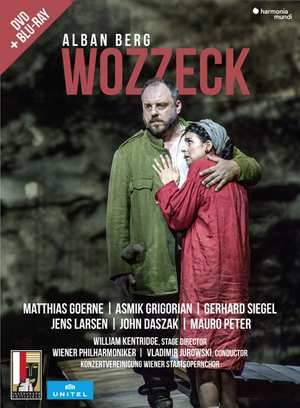BERG Wozzeck (Jurowski)
View record and artist detailsRecord and Artist Details
Composer or Director: Alban Berg
Genre:
Opera
Label: Harmonia Mundi
Magazine Review Date: AW18
Media Format: Digital Versatile Disc
Media Runtime: 101
Mastering:
DDD
Catalogue Number: HMD980 905354

Tracks:
| Composition | Artist Credit |
|---|---|
| Wozzeck |
Alban Berg, Composer
Alban Berg, Composer Asmik Grigorian, Marie, Soprano Frances Pappas, Margret, Mezzo soprano Gerhard Siegel, Captain, Tenor Heinz Göhrig, Madman, Tenor Huw Montague Rendall, Second apprentice, Baritone Jens Larsen, Doctor, Bass John Daszak, Drum Major, Tenor Matthias Goerne, Wozzeck, Baritone Mauro Peter, Andres, Tenor Salzburg Festival Children’s and Theatre Choir Tobias Schabel, First Apprentice, Bass Vienna Philharmonic Orchestra Vienna State Opera Concert Choir Wladimir Jurowski, Conductor |
Author: Peter Quantrill
In scenic terms, this is the world of the recent ‘Aftermath’ exhibition at Tate Britain, of Paul Nash and George Grosz as well as the director’s own trademark charcoal projections. The unitary set fits compactly into Salzburg’s Haus für Mozart, formerly known as the Kleines Festspielhaus to distinguish it from the cavernous Felsenreitschule that hosted Lulu in 2010, in another artist-designed production. In an interview after this production took place last year, Kentridge’s designer Sabine Theunissen compared the set to a doll’s house, and it is not only Wozzeck and Marie’s poor child, presented as a gas-masked dummy, who loses his humanity within it – though the very end is undeniably chilling.
The venality of the General, the Doctor’s sadism and the Drum Major’s dumb-cunning priapism: these are all broadly sketched in. It is left to Goerne and Grigorian between them to convey the pervasive sense of an army from whose ranks Wozzeck is an outcast as much as he is from (un)civil society, the kind of culture being gradually uncovered by the inquests into the apparent suicides at the Deepcut barracks in the UK. Even so, there are resonant scenes and lines – ‘Wir arme leut’, ‘Einer nach dem andern’ – that come and go in half-hearted fashion like the low-lifes dropping in and out of Dr Schön’s house in Lulu. Goerne’s supreme self-absorption in the title-role was better encountered in Keith Warner’s staging at the Royal Opera, just as Grigorian’s vocal power and charisma found closely attentive theatrical direction worthy of it in Christof Loy’s production for Oslo – neither of them yet available on film.
Needlepoint conducting serves to underline, at least for UK listeners, how useful Britten found the score in setting Owen for the War Requiem. Jurowski keeps the Vienna Philharmonic on a much tighter leash than Böhm or even Abbado did, without ever quite rivalling Currentzis (conducting Dmitri Tcherniakov’s staging at the Bolshoi) for the most acute match of word to sound to gesture. Audio direction is more focused than video: a lot more can be heard than seen in the tavern. It’s an arresting show but Maderna/Liebermann, Barenboim/Chereau and Currentzis/Tcherniakov all draw sharper and therefore more affecting portraits of real people, Berg and Büchner among them.
Discover the world's largest classical music catalogue with Presto Music.

Gramophone Digital Club
- Digital Edition
- Digital Archive
- Reviews Database
- Full website access
From £8.75 / month
Subscribe
Gramophone Full Club
- Print Edition
- Digital Edition
- Digital Archive
- Reviews Database
- Full website access
From £11.00 / month
Subscribe
If you are a library, university or other organisation that would be interested in an institutional subscription to Gramophone please click here for further information.




